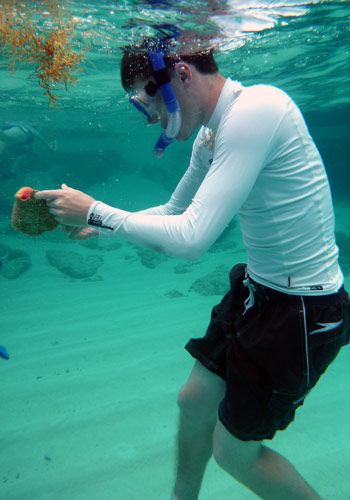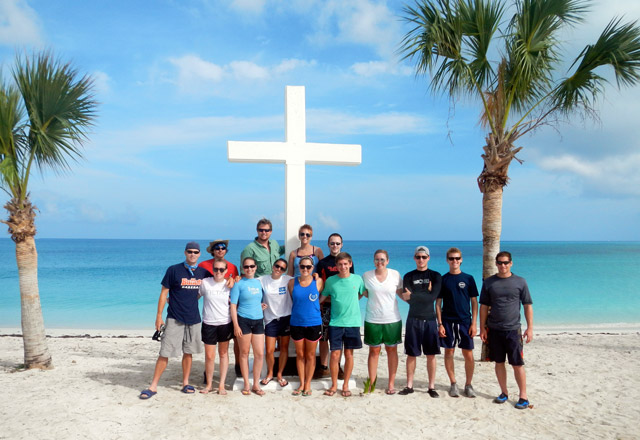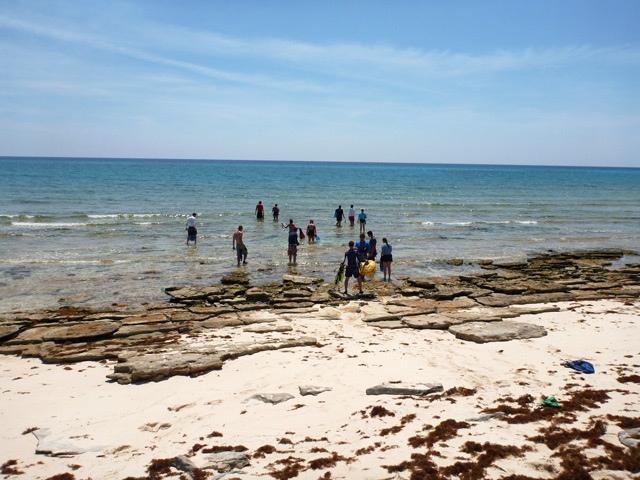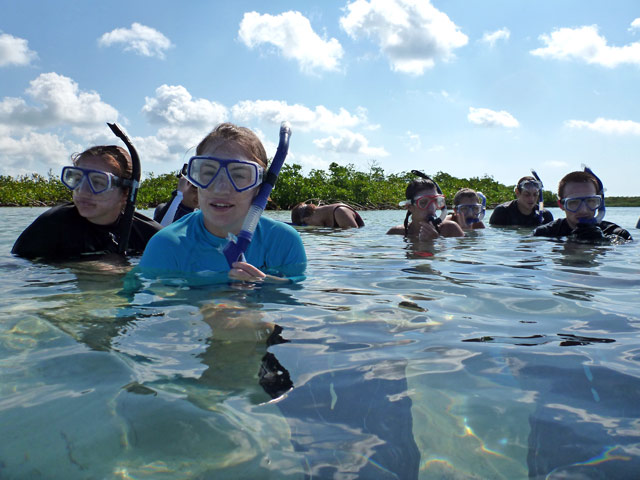An award for helping low-income, first-generation-to-college students gain access to higher education was presented to Gettysburg College Dean of Intercultural Advancement Pete Curry.
Twenty-six students have graduated from Gettysburg College after coming to campus via Philadelphia Futures, which gave Curry its “Hats Off to You” award.
“It wouldn’t be a stretch to say that my time with Dean Curry has shaped my life,” said Unique Patterson `10, one of the graduates and current students who surrounded Curry at the June 5 ceremony in Philadelphia.
 “Dean Curry really thrives when he keeps growing right along with us. That’s part of his magic. And that’s why everyone loves him and feels so lucky to have him in our corner,” said Vasiljon Cobo ’14. More student comments are below.
“Dean Curry really thrives when he keeps growing right along with us. That’s part of his magic. And that’s why everyone loves him and feels so lucky to have him in our corner,” said Vasiljon Cobo ’14. More student comments are below.
"For the last 11 years, Philadelphia Futures has had the honor of sharing a groundbreaking college partnership with Gettysburg College," said Philadelphia Futures Executive Director Joan C. Mazzotti, Executive Director of Philadelphia Futures. "Pete has played a significant role in our students’ success. He has been a great partner and friend to all of us. None of this would be possible without his fervent dedication and work. We are grateful for the opportunities that have been afforded to our traditionally underrepresented students, and look forward to many more years of successful partnership with Gettysburg."
“Pete, you are our friend and you are our hero,” Mazzotti said. “It is a privilege to share with you a common and critical mission of educational advancement for all students. We are deeply grateful for your steadfast commitment to our scholars and to the broader success of all low-income, first-generation-to-college students.”
Philadelphia Futures prepares high-potential, economically disadvantaged students to enter and succeed in college by providing the tools, resources and opportunities necessary for their success. It has helped 400 students obtain degrees. The June 5 ceremony at which Curry received his award was a celebrations of Philadelphia Futures’ latest high school and collegiate grads.
Jennifer Ramirez '08
I am a proud 2008 graduate of Gettysburg College. I am thrilled to be here tonight to help honor Dean Curry.
When I arrived at Gettysburg in 2004, I was stunned by just about everything I encountered – people didn’t look like me, the academic work nearly took my breath away, and I found myself plopped in the middle of Pennsylvania cow-country and its Civil War battlefields. I was in another world.
And when I found myself struggling in that first semester, Dean Curry said something very important to me. He said, “It’s not can you do the work; it’s will you do the work?”
He knew I could do the work. He believed in me.
And he didn’t want to let any excuse get in my way.
All of us up here can remember the many words of wisdom that Dean knew to say at just the right time. One of my favorites was when he would say, “If you always do what you’ve always done, you’ll always get what you’ve always gotten.” He wanted us to realize that if we wanted different outcomes in our lives, we had to choose to do things differently to help make a change.
But sometimes it was not just his words that were life-changing, but his actions.
In 2006 my father passed away. Dean didn’t just ask me how I was doing or send a sympathy card. He came to the funeral. He showed me the kind of support that he had come to embody in his work with students. His presence with me that day was very powerful. That kindness will stay with me forever – it truly helped me to navigate a very difficult time in my life. For that, Pete, I am ever grateful.
Vasiljon Cobo ’14
At the heart of what Dean Curry does is the way he helps his students discover who they are. He invites us to take risks, to listen to one another, to dare to consider another perspective. He encourages us to embrace a global worldview. He wants our worlds to be as big as possible. He has a big vision for all of us – and is just aching for us to step into our best.
I have spent lots of time with Dean at the men’s events he hosts at his house. At these events, it’s important to him to create an atmosphere of support. And he does just that. Dean Curry has helped me to open up about important things and connect to people from other urban areas like where I come from. Like so many students, I will always be grateful for his kindness, his tough love and his warm hospitality.
But Dean knows me well enough to know that this tribute can’t be all serious, because no matter how big a worldview he hopes I develop, he knows his own worldview still has room to grow. I won’t rest until he gives Italian soccer a chance, and I know he won’t rest until I cheer for the Cleveland Browns in at least one football game. We both know there is probably very little chance of either one of those things happening. But we keep trying. And I think that’s the point.
Dean Curry really thrives when he keeps growing right along with us. That’s part of his magic. And that’s why everyone loves him and feels so lucky to have him in our corner.
Unique Patterson ’10
It wouldn’t be a stretch to say that my time with Dean Curry has shaped my life. My work in the Intercultural Resource Center during college, the weekly meetings I had with him, the ways he inspired me to follow my heart when choosing a major – all of these things have shaped me.
Today I work at Franklin and Marshall College with the National College Advising Corps, serving high school students and helping them navigate the complex web of college admissions. It is my personal mission to support low-income, first-generation-to-college students, and Dean Curry has been largely influential in this. He used to say to us, “Be true to yourself, no matter where you find yourself.”
Like Dean Curry, I hope to pursue a career in higher education – specifically, I want to work in the field of college retention. This is the best way I can think of to be true to myself and to the world around me. And I will always be grateful for his insight and influence.
Founded in 1832, Gettysburg College is a highly selective four-year residential college of liberal arts and sciences with a strong academic tradition. Alumni include Rhodes Scholars, a Nobel laureate, and other distinguished scholars. The college, which enrolls 2,600 undergraduate students, is located on a 200-acre campus adjacent to the Gettysburg National Military Park in Pennsylvania.
Contact: Jim Hale, associate director of editorial services
 On Aug. 23, first-year students will participate in the traditional First-Year Walk to hear a reading of Abraham Lincoln's "Gettysburg Address" at the Soldiers' National Cemetery in Gettysburg. Scott Hartwig, chief historian at the Gettysburg National Military Park, will read the address. The First-Year Walk looks back to Nov. 19, 1863, when Gettysburg College students and townspeople processed with Abraham Lincoln to the Soldiers' National Cemetery where he delivered his "Gettysburg Address." David Wills, who was an 1851 Gettysburg College graduate and local attorney, invited Lincoln to deliver "a few appropriate remarks." Lincoln stayed at his home the night before the Address. The First-Year Walk started in 2003 thanks to the efforts of a student, Lindsey Morlock '04, who wanted to find a way for students to connect with this critical moment in history.
On Aug. 23, first-year students will participate in the traditional First-Year Walk to hear a reading of Abraham Lincoln's "Gettysburg Address" at the Soldiers' National Cemetery in Gettysburg. Scott Hartwig, chief historian at the Gettysburg National Military Park, will read the address. The First-Year Walk looks back to Nov. 19, 1863, when Gettysburg College students and townspeople processed with Abraham Lincoln to the Soldiers' National Cemetery where he delivered his "Gettysburg Address." David Wills, who was an 1851 Gettysburg College graduate and local attorney, invited Lincoln to deliver "a few appropriate remarks." Lincoln stayed at his home the night before the Address. The First-Year Walk started in 2003 thanks to the efforts of a student, Lindsey Morlock '04, who wanted to find a way for students to connect with this critical moment in history. During the afternoon on Aug. 24, first-year students will come together within their respective residence halls to compete in a series of high stakes challenges, better know as Field Day. Bragging rights are awarded to the residence hall with the most wins.
During the afternoon on Aug. 24, first-year students will come together within their respective residence halls to compete in a series of high stakes challenges, better know as Field Day. Bragging rights are awarded to the residence hall with the most wins. The exhibition examines the work of two artists who were inextricably linked to each other and to the development of modern photography. Atget (The Eclipse, Paris, 1912 pictured at left) was dismayed by the amount of architectural history being destroyed during the modernization of Paris and began photographing the city’s shop fronts, streets, and neighborhoods in 1898. In 1925, Abbott met Atget when she was working as a darkroom assistant to artist Man Ray. Abbott was deeply and permanently affected by Atget’s images; she wrote, “There was a sudden flash of recognition—the shock of realism unadorned.” Abbott spent eight years in Paris, and on a visit to New York in 1929 was consumed by the desire to capture the physical change of the city. Her efforts produced a catalog of images that, like Atget’s earlier photographs of Paris, records the essential character of the city.
The exhibition examines the work of two artists who were inextricably linked to each other and to the development of modern photography. Atget (The Eclipse, Paris, 1912 pictured at left) was dismayed by the amount of architectural history being destroyed during the modernization of Paris and began photographing the city’s shop fronts, streets, and neighborhoods in 1898. In 1925, Abbott met Atget when she was working as a darkroom assistant to artist Man Ray. Abbott was deeply and permanently affected by Atget’s images; she wrote, “There was a sudden flash of recognition—the shock of realism unadorned.” Abbott spent eight years in Paris, and on a visit to New York in 1929 was consumed by the desire to capture the physical change of the city. Her efforts produced a catalog of images that, like Atget’s earlier photographs of Paris, records the essential character of the city. Visualizing War
Visualizing War But it is only one part of Ed Johnson’s extensive legacy of dedication to Gettysburg College, which recognized him in 2000 with its Lavern H. Brenneman Award for Exemplary Service. At the fall 2010 Board of Trustees meeting, he was elected an honorary life trustee.
But it is only one part of Ed Johnson’s extensive legacy of dedication to Gettysburg College, which recognized him in 2000 with its Lavern H. Brenneman Award for Exemplary Service. At the fall 2010 Board of Trustees meeting, he was elected an honorary life trustee. “My specific project was to gather and document campaign materials used in a previous exhibit that ran from the 1970s through the 1990s,” says Cranfill.
“My specific project was to gather and document campaign materials used in a previous exhibit that ran from the 1970s through the 1990s,” says Cranfill. As Cranfill enters her sophomore year at Gettysburg, she already has one meaningful internship under her belt and plans to seek out similarly stimulating work experiences in the future. She cites her positive experiences as a first-year student at Gettysburg as having a large impact on her level of preparedness going into the internship in June. Cranfill especially appreciates the support of her academic adviser,
As Cranfill enters her sophomore year at Gettysburg, she already has one meaningful internship under her belt and plans to seek out similarly stimulating work experiences in the future. She cites her positive experiences as a first-year student at Gettysburg as having a large impact on her level of preparedness going into the internship in June. Cranfill especially appreciates the support of her academic adviser,  “Prof. Robert Natter invited me to undertake an independent study on choral composition and conducting, and I composed a piece that the choir performed and recorded,” Carlson said. “Prof. Avner Dorman encouraged me to compose seriously—and that became a big part of my Gettysburg experience. One assignment was to write a piece for an ensemble in a style that I’ve never heard of—in two weeks. The first part of what I wrote sounded like a machine, so I called it “A Well-Oiled Machine,” but it eventually goes haywire. My composition won first place in the Pennsylvania Music Educators Association collegiate division competition.”
“Prof. Robert Natter invited me to undertake an independent study on choral composition and conducting, and I composed a piece that the choir performed and recorded,” Carlson said. “Prof. Avner Dorman encouraged me to compose seriously—and that became a big part of my Gettysburg experience. One assignment was to write a piece for an ensemble in a style that I’ve never heard of—in two weeks. The first part of what I wrote sounded like a machine, so I called it “A Well-Oiled Machine,” but it eventually goes haywire. My composition won first place in the Pennsylvania Music Educators Association collegiate division competition.” “In Vienna, I wanted to learn as much about the composer Gustav Mahler as possible because I was preparing Mahler songs for an audition. That led me to an internship with an expert on Mahler,” Tuttle said.
“In Vienna, I wanted to learn as much about the composer Gustav Mahler as possible because I was preparing Mahler songs for an audition. That led me to an internship with an expert on Mahler,” Tuttle said. “Through the images, we are trying to show moments in life that any person could share – the children waiting at the bus stop, the preschool graduation, religious traditions. Looking at them without any context, these photos could have been taken anywhere outside of Adams County, Pa., but in reality it’s only 14 miles down the road. That’s a very powerful experience for students,” said Jorge Perez-Rico, director of the Migrant Education Technological Center for Adults and Families and parent coordinator. Perez-Rico is also a community liaison at Gettysburg College’s
“Through the images, we are trying to show moments in life that any person could share – the children waiting at the bus stop, the preschool graduation, religious traditions. Looking at them without any context, these photos could have been taken anywhere outside of Adams County, Pa., but in reality it’s only 14 miles down the road. That’s a very powerful experience for students,” said Jorge Perez-Rico, director of the Migrant Education Technological Center for Adults and Families and parent coordinator. Perez-Rico is also a community liaison at Gettysburg College’s 

 “Rebelling for the Promise of Revolution: Black Emancipation and the Civil War” Lecture by Gettysburg College Prof. Scott Hancock
“Rebelling for the Promise of Revolution: Black Emancipation and the Civil War” Lecture by Gettysburg College Prof. Scott Hancock 






 In the entertainment industry, Gordon led television stations from a pre-VHS and DVR world into the digital age – and as a leader in interactive media, helped navigate an industry into a new millennium that had yet to see broadband, video, mobile or social media.
In the entertainment industry, Gordon led television stations from a pre-VHS and DVR world into the digital age – and as a leader in interactive media, helped navigate an industry into a new millennium that had yet to see broadband, video, mobile or social media. Burris has been a guiding force behind such high profile network television shows as Warner Brothers' “Growing Pains,” serving as supervising producer; executive producer/showrunner on Disney's “Thunder Alley” and the Dave Chappelle vehicle “Buddies,” created by Matt Williams (Roseanne, Home Improvement); executive producer/showrunner of “In the House” starring LL Cool J; supervising producer of “Just the Ten of Us” and executive producer/showrunner of the Disney Channel original series “The Jersey” as well as contributing to numerous pilots.
Burris has been a guiding force behind such high profile network television shows as Warner Brothers' “Growing Pains,” serving as supervising producer; executive producer/showrunner on Disney's “Thunder Alley” and the Dave Chappelle vehicle “Buddies,” created by Matt Williams (Roseanne, Home Improvement); executive producer/showrunner of “In the House” starring LL Cool J; supervising producer of “Just the Ten of Us” and executive producer/showrunner of the Disney Channel original series “The Jersey” as well as contributing to numerous pilots. After film school at the University of Southern California, Levine started his career in on-air-promo at NBC – transitioning into dramatic programs and covering shows like Hill Street Blues, Miami Vice and L.A. Law.
After film school at the University of Southern California, Levine started his career in on-air-promo at NBC – transitioning into dramatic programs and covering shows like Hill Street Blues, Miami Vice and L.A. Law.  This is the first time that Gettysburg College has been given this designation. The honor comes with a cash award that will go toward programming events put on by the Gettysburg College chapter. The organization regularly sponsors public lectures given by professionals in a variety of career fields.
This is the first time that Gettysburg College has been given this designation. The honor comes with a cash award that will go toward programming events put on by the Gettysburg College chapter. The organization regularly sponsors public lectures given by professionals in a variety of career fields.